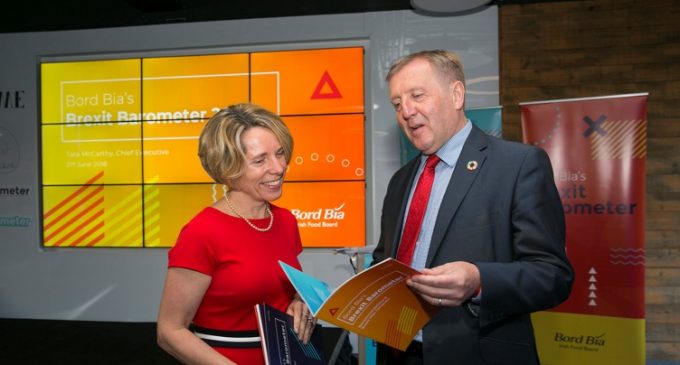Bord Bia’s 2018 Brexit Barometer Results

The Minister for Agriculture, Food and the Marine Michael Creed TD has launched the Bord Bia 2018 Brexit Barometer, a comprehensive survey of 117 Irish food, drink and horticulture companies, representing 48% of the sector’s exporters to the United Kingdom. Over 100 senior industry representatives attended the launch in Bord Bia to hear the report findings.
The purpose of the Brexit Barometer is to assess the sector’s progress as it prepares for the UK’s exit from the European Union, and in doing so, provide a factual basis from which to inform company actions and Bord Bia programmes. The 2018 Brexit Barometer questioned participants on Brexit readiness, along with six key Brexit issues that face the sector: UK Customer Relationships, Supply Chain, Customs and Tariffs, Financial Resilience, Marketing Diversification and Emerging Risks.
The Brexit Barometer concludes with a Brexit Plan Template, available to Bord Bia client companies, together with recommendations related to each of these six key Brexit issues.
Brexit Readiness
The survey found that while 60% of respondents remain uncertain as to the impact of Brexit on their business, 74% have made progress in preparing for potential outcomes compared to this time last year. Some 25% of companies said they were pessimistic about Brexit’s impact on their business.
UK Customer Relationships
Irish food and drink companies are making progress when it comes to developing relationships and identifying growth opportunities with existing UK customers. 85% of participants have met with their key UK customers within the last 12 months, while 80% believe that they will continue to have opportunities to increase sales in the UK market. 54% of companies have developed a marketing strategy specifically tailored for the UK market, a significant increase on last’s year’s figure of 39%.
Supply Chain
62% of respondents have mapped their supply chain to identify possible delays, costs and customs challenges arising from Brexit, while 40% have taken steps to reduce their supply chain costs as a result of Brexit. In terms of sourcing, 24% of companies have changed their sourcing strategy.
Customs and Tariffs
45% of companies surveyed believe they have reasonable or significant experience in dealing with official requirements relating to the importation or exportation of goods from non-European Union markets. Additionally, only 32% of companies have modelled the potential impact that costs arising from customs duties and tariffs may have on sales to the UK.
Financial Resilience
According to the findings of the 2018 Brexit Barometer, only 7% of businesses surveyed would begin to experience severe difficulty in the £0.85 – £0.89 exchange rate range. This represents a significant drop from 28% in 2017. 50% of respondents say that Brexit has not impacted on their investment strategy over the last year, while only 17% have held off on expenditure projects. Significantly, 97% remain committed to Ireland as a supply base.
Market Diversification
85% of companies surveyed are actively seeking to expand their business into new markets, with 43% reporting a growth of between 1% and 10% within the past 12 months. In terms of growth markets outside the UK, Europe is the most popular at 86%, followed by the USA & Canada (49%), the Middle East (49%) and China (33%).
61% of respondents say that they have developed a marketing strategy specifically tailored for non-UK markets, compared to 56% in 2017.
Emerging Risks
With negotiations between the UK and European Union ongoing, there is an ever-evolving landscape with new risks emerging. In terms of these risks, respondents identified the impact of UK inflation on Ireland, regulatory/legislative changes and an increase in competition as the most pressing concerns.
Launching the report, the Minister for Agriculture, Food and the Marine Michael Creed TD (pictured right), said:“It is heartening to see the progress Irish food and drink exporters have made in the last 12 months in preparing for the challenge that Brexit presents. Trade to our largest food and drink export market expanded by 7% in 2017 to reach €4.4 billion, confirmation of the extent to which our two countries remain finely tuned in terms of supply and demand. Though uncertainty remains a constant element for these companies, the 2018 Bord Bia Brexit Barometer shows significant progress has been made in a number of areas.”
Tara McCarthy (pictured left), Chief Executive of Bord Bia, commented: “In the two years since the UK voted to leave the European Union, Bord Bia has taken the view that the Irish food industry must plan, act and take ownership, where possible, of the risks it poses. The Brexit Barometer has been a central and insightful resource in this regard. While uncertainly remains, I can say with confidence that Bord Bia is proactively working to fully support companies who are responding to the challenges of Brexit and building their potential for better trade outcomes in the future.”
Tara McCarthy has also launched a new refreshed Bord Bia Brexit training programme including workshops on Customs, Currency Risk and Supply Chain and also Bord Bia’s new way of working to support companies in the post Brexit world. “’Plan to Grow’ is the culmination of 12 months development work by our internal teams. My vision is that Bord Bia will now use our unique understanding of the Irish food industry’s needs to provide a focused framework of support that will deliver robust marketing strategies for our clients,” she explained. “The Plan to Grow framework will underpin all of our conversations with clients, as well as the supports and services we will offer in the future.”
























